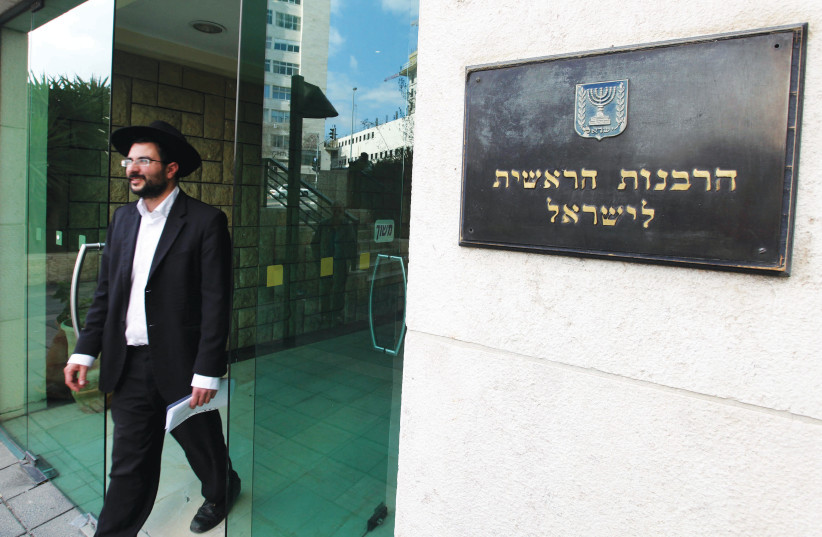Why were people demonstrating outside of rabbinical courts on Tuesday?
The answer to this question is indicative of a common denominator in many of the current government’s policies since its inception: To give itself more power at the expense of the judiciary, independent statutory bodies, local authorities, and more.
The government and coalition are currently promoting a number of laws regarding Israel’s religious courts and rabbinical apparatus, both of which are largely controlled by the ultra-Orthodox (haredi) parties. One, which received fast-track status in the Knesset, will increase the power of the Chief Rabbinate Council to appoint city and neighborhood rabbis, at the expense of the municipalities themselves.
A second proposal wishes to expand the religious courts’ jurisdiction so that it can hear civil cases. The religious courts are traditionally less friendly to women than the civil courts. Broader jurisdiction for ultra-Orthodox judges means more rulings that favor men, more power for the ultra-Orthodox parties, and thus more power for the current government.
The judicial reforms also aim to broaden the executive branch’s power, this time at the expense of the judicial branch. Note especially the proposal to give the government an automatic majority in the Judicial Selection Committee, which means that the government will have power to appoint judges as it sees fit.

Many ministers and coalition members, reportedly including Prime Minister Benjamin Netanyahu himself in his phone conversation with the US president, have said that the makeup of the judicial selection committee is an issue that is still on the table.
Pending Knesset bills up for discussion
The second judicial reform bill that could come up after the Knesset summer recess is one that would render the legal opinions of the attorney-general and ministerial legal advisers nonbinding. The legal advisers in each government ministry are currently the official interpreters of the law – and have the power to declare to ministers that their planned actions are illegal. Should this be nonbinding, ministers will have the power to go ahead with their illegal plans, regardless.
Another controversial bill that the government is advancing is one that will dismantle the current Women’s Status Authority, which is an independent body, and replace it with an authority whose executive committee will be appointed by the government itself. More power for the government at the expense of independent regulators.
Onwards. Communications Minister Shlomo Karhi outlined on Monday a reform in Israel’s television broadcasting market. The reform includes the dismantling of the current regulatory bodies – the Second Authority for Television and Radio and the Cable and Satellite Broadcasting Council – and replacing them with a regulatory committee appointed by… the government. Again, more power for the government at the expense of independent regulators.
Then there is the National Security Ministry. Minister Itamar Ben-Gvir had a law passed in December that broadened his power to set policy for the Israel Police.
Another provision of the bill, which said that the Israel Police Commissioner would be directly subordinate to the minister, was avoided at the last minute. Attorney-General Gali Baharav-Miara said on Tuesday that the government had pressured law enforcement to change its treatment of the protests against the judicial reforms. This indicates that at least some ministers believe they should have the power to involve themselves in specific cases and tactics against protestors.
The protests are at the moment focused on opposing the reasonableness standard bill, which also aims to increase executive power by taking away a tool that the Supreme Court uses to evaluate the government’s actions when they are challenged in court.
But the protestors' fear of a dictatorship are not based on the reasonableness bill alone, and are not a result of someone "playing with their minds," as finance minister Bezalel Smotrich suggested on Tuesday. Rather, the government has shown over and over again that it seeks to enlarge its own power and weaken those who are meant to check that power – be it regulators, the courts, or law enforcement.
Some of these bills are eerily similar to the playbook used by Hungary and Poland in recent years – and that is the direction protestors fear that Israel is headed.
Expanding the power of the religious courts and Chief Rabbinate means expanding the power of the ultra-orthodox parties, who are currently in the government. This is part of the same phenomena of a government wishing to extend its powers - and is why people demonstrated outside rabbinical courts on Tuesday.
